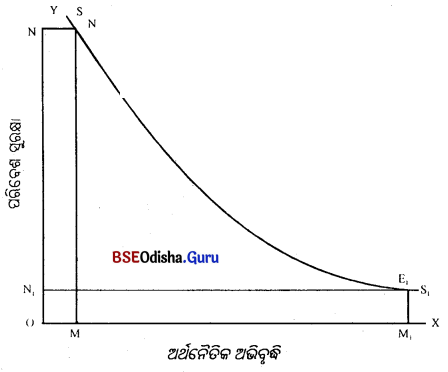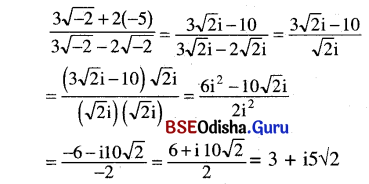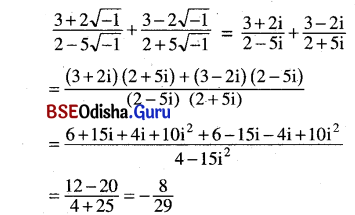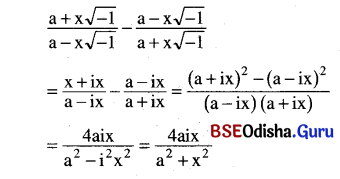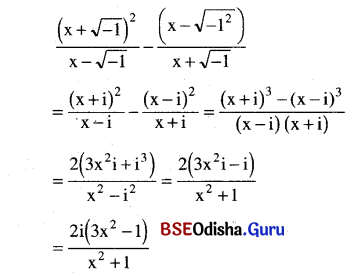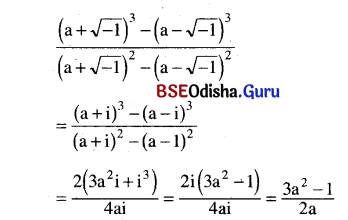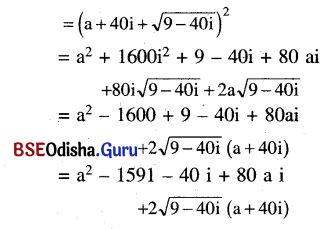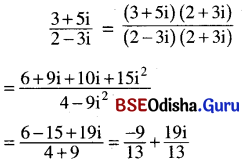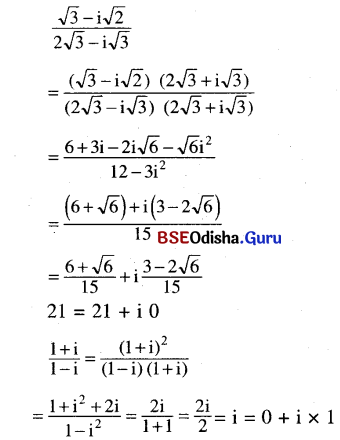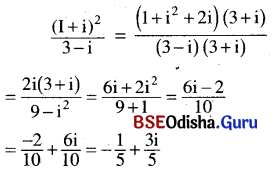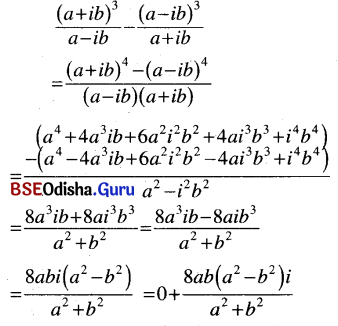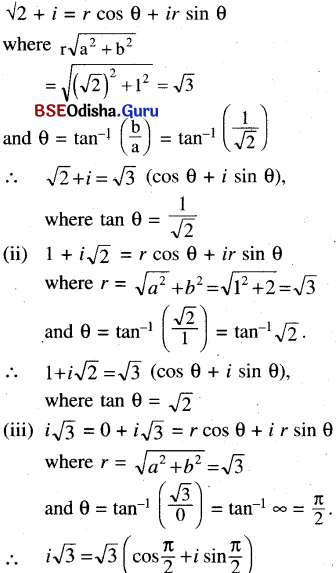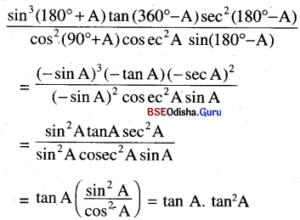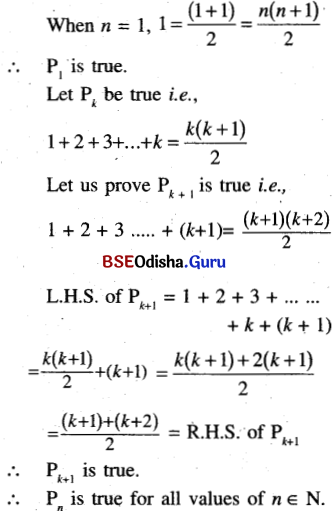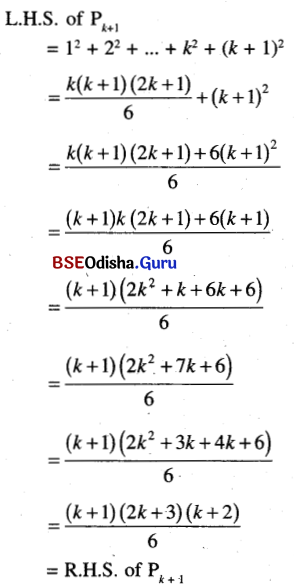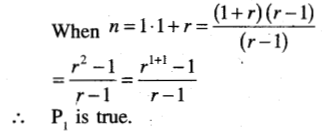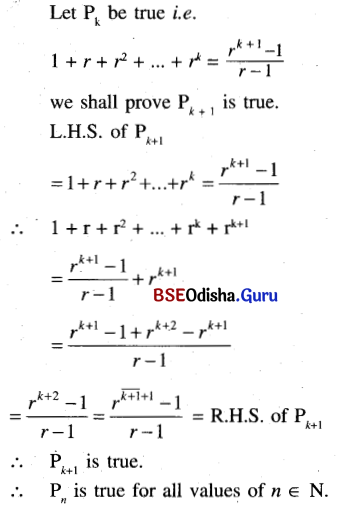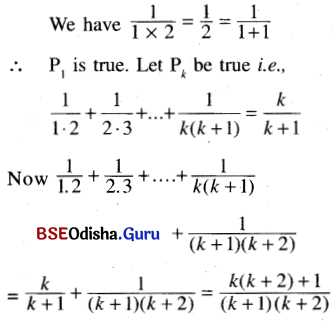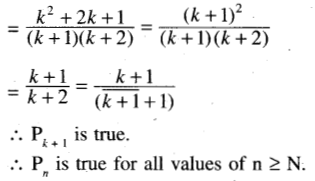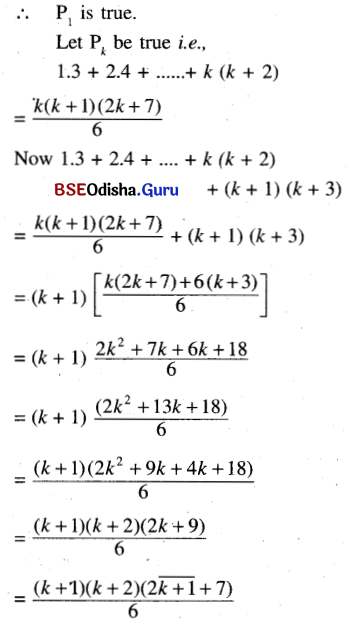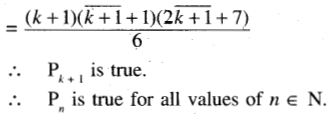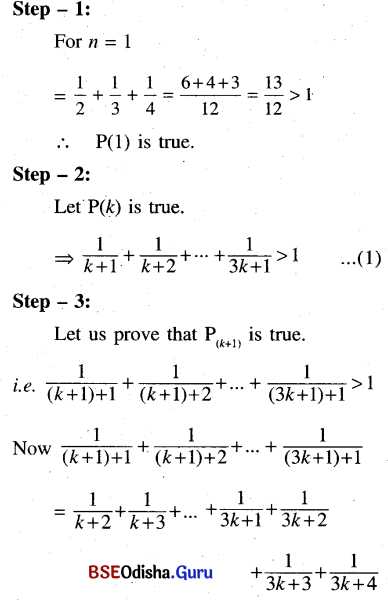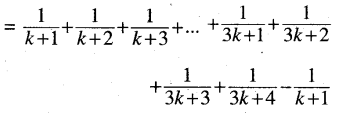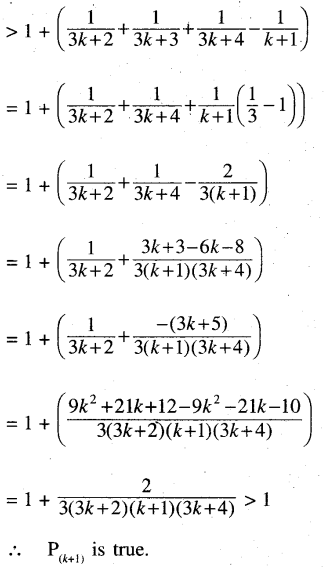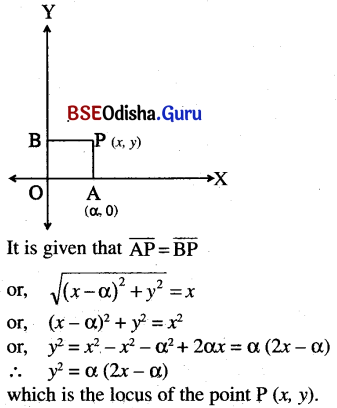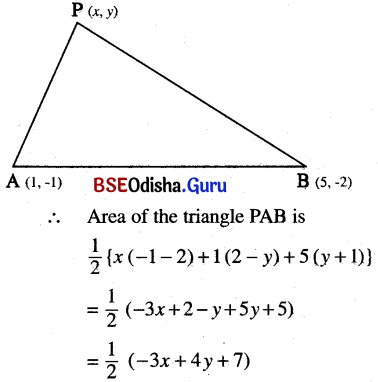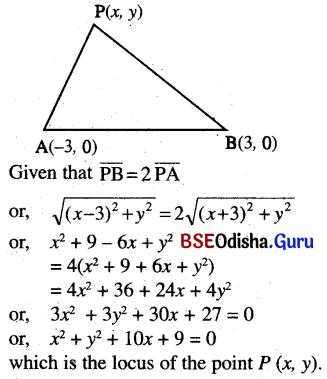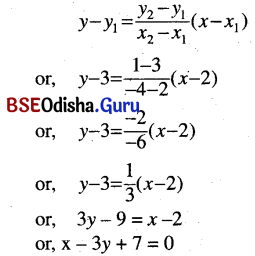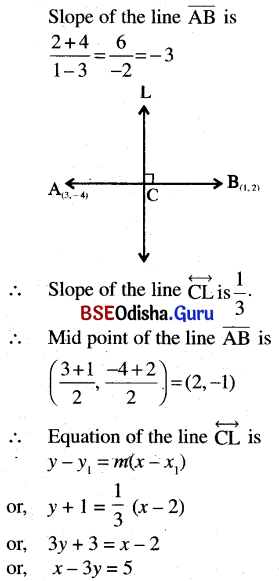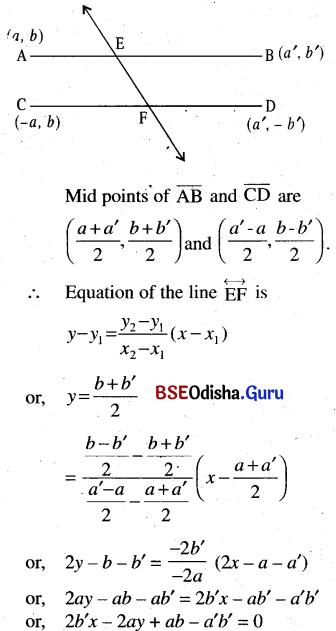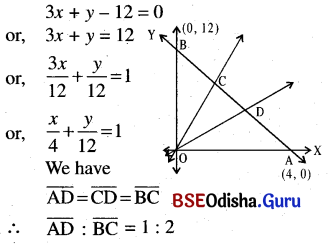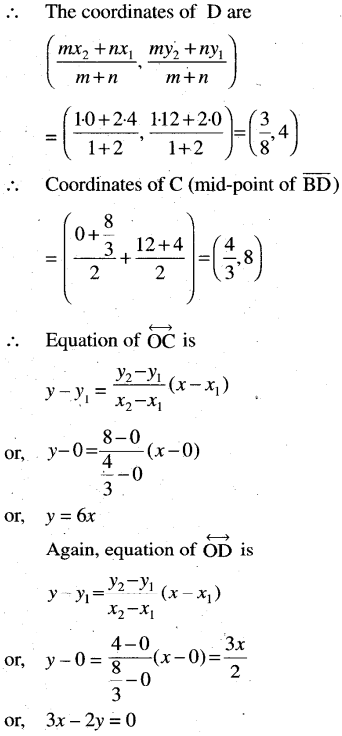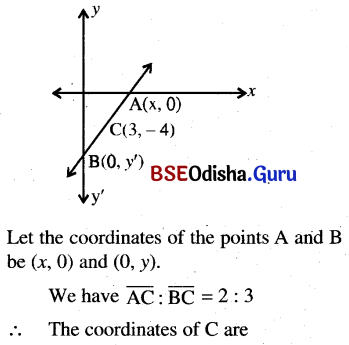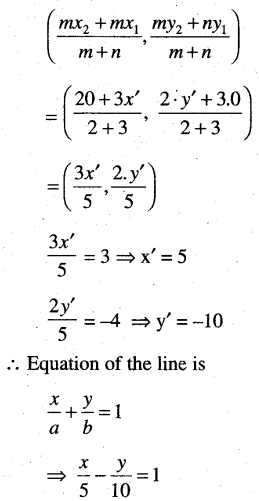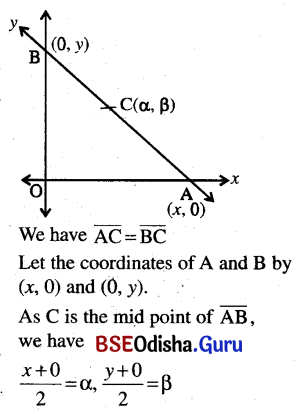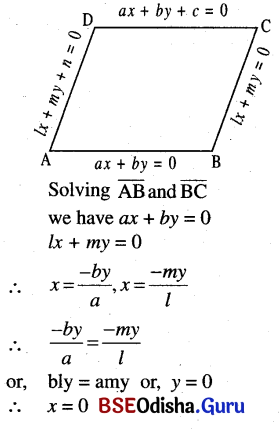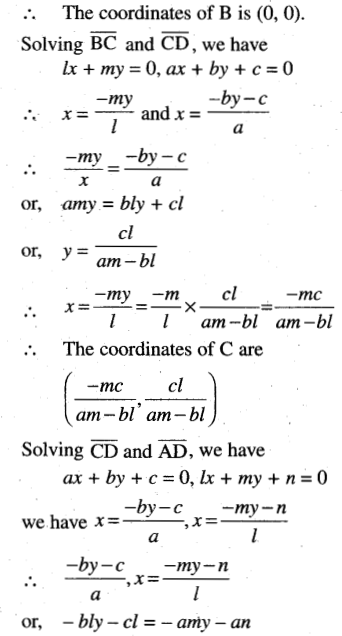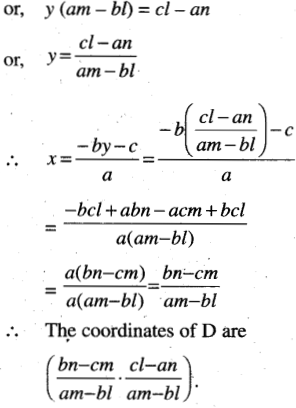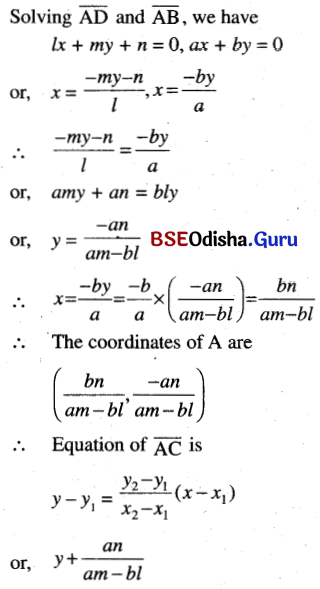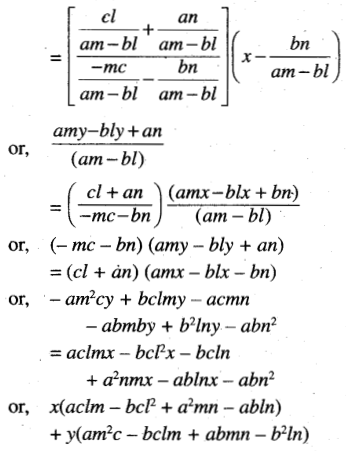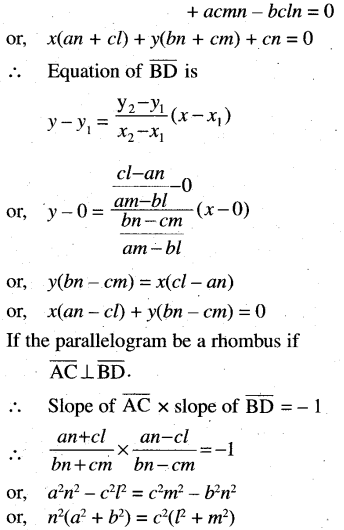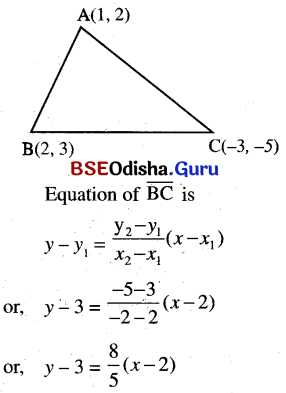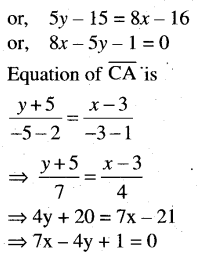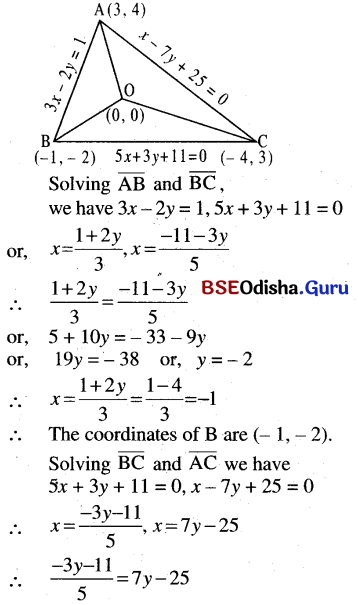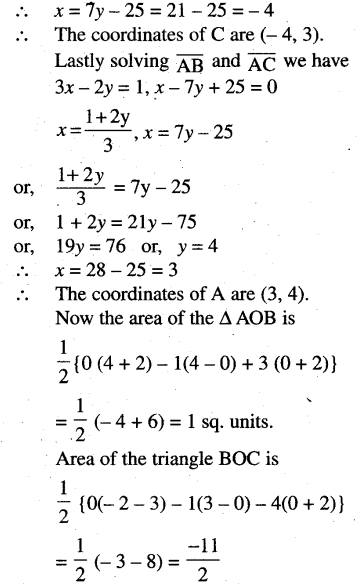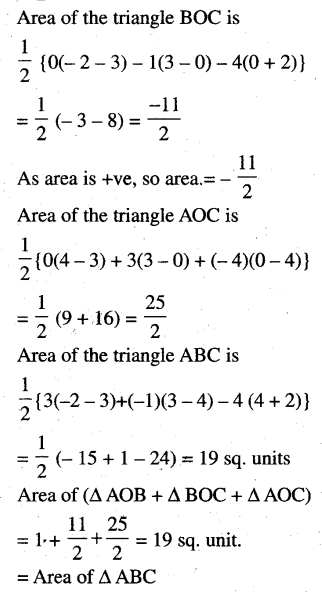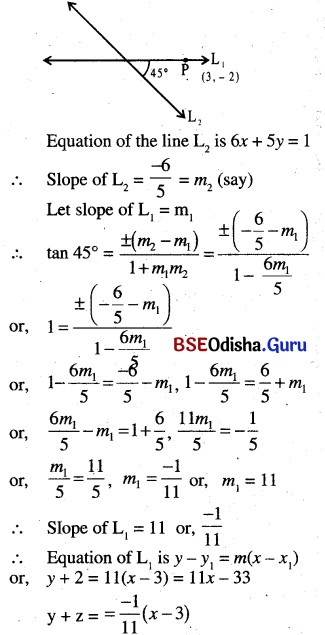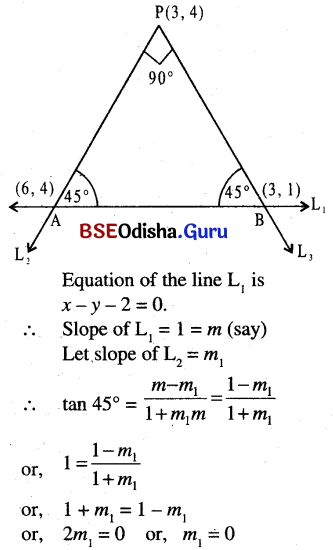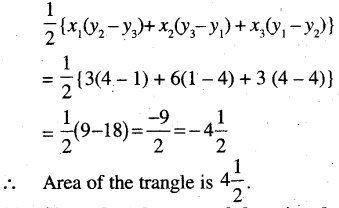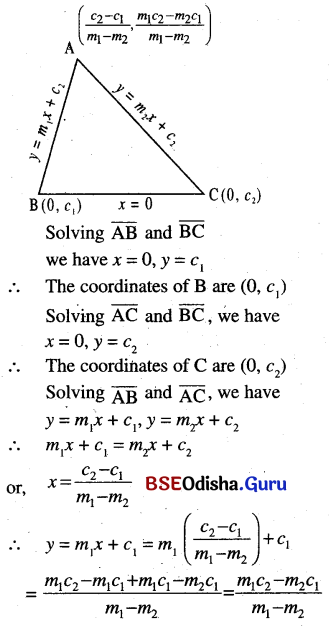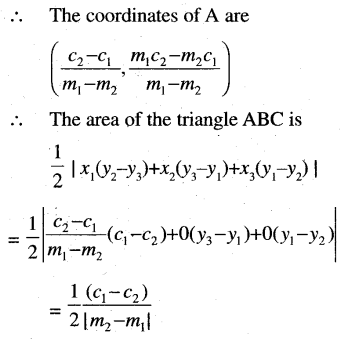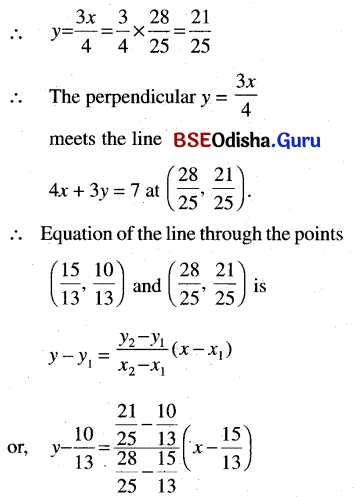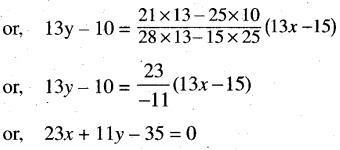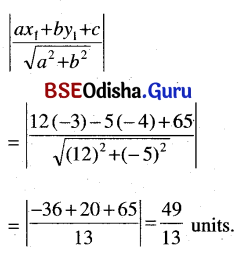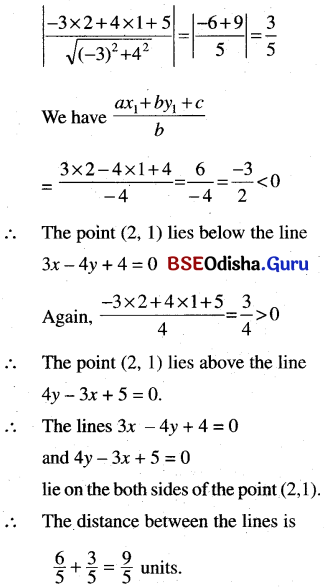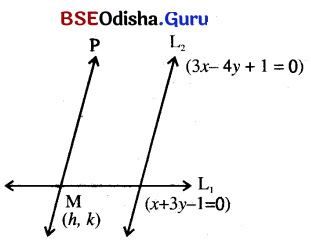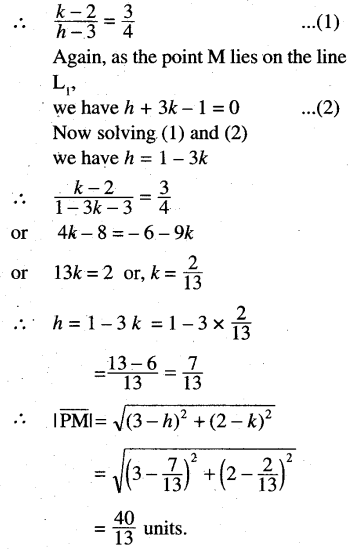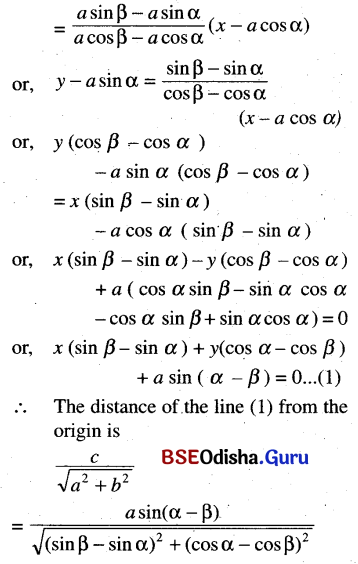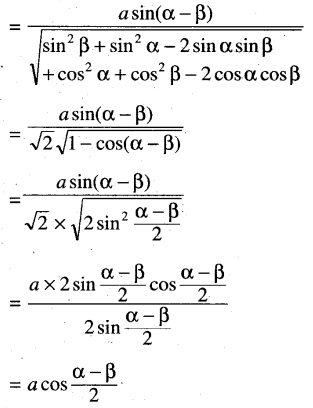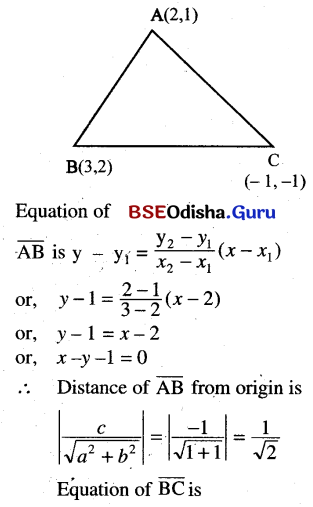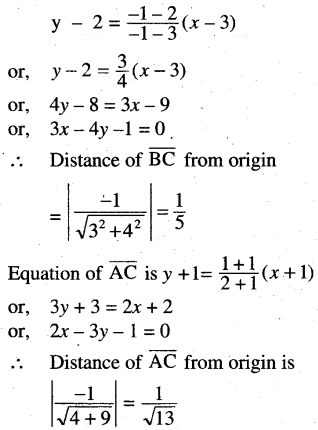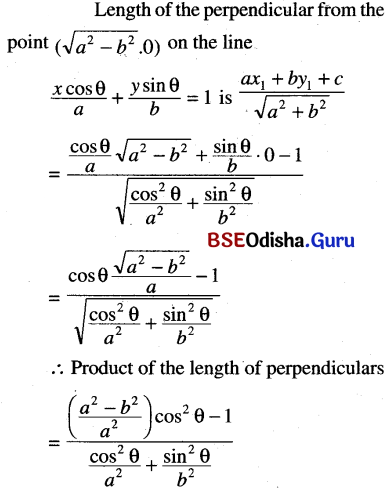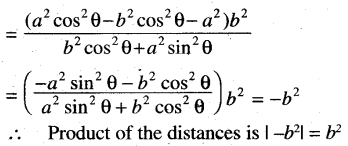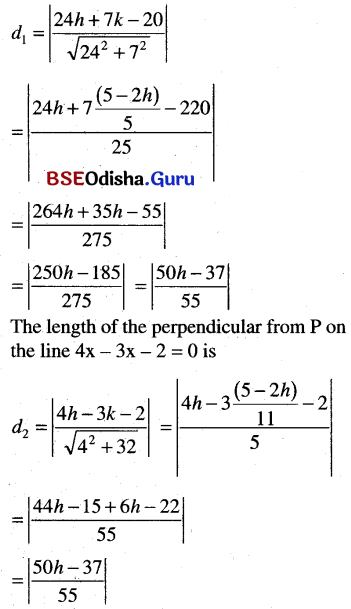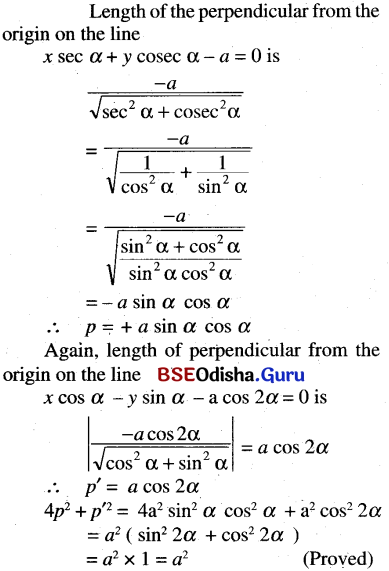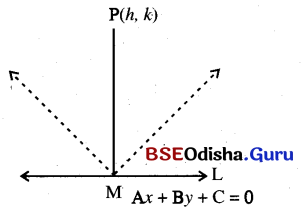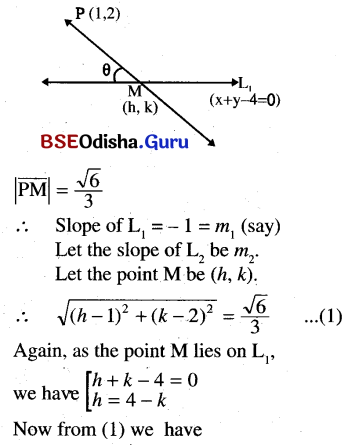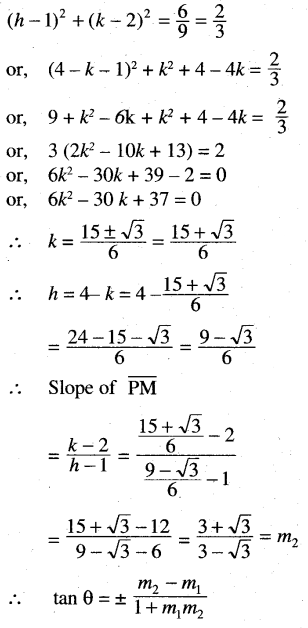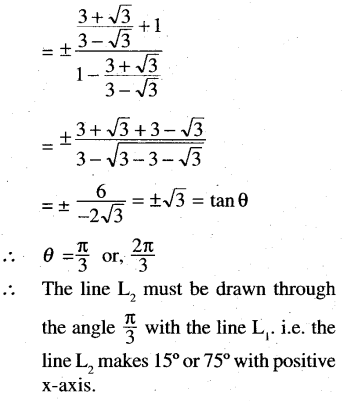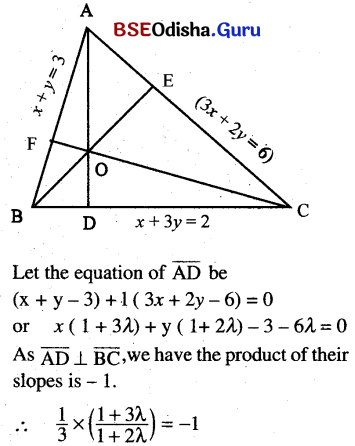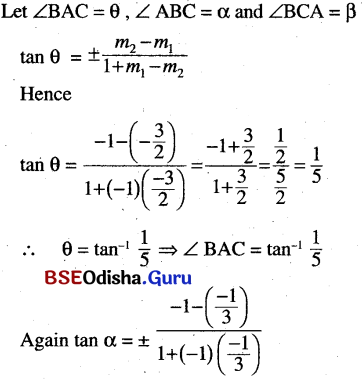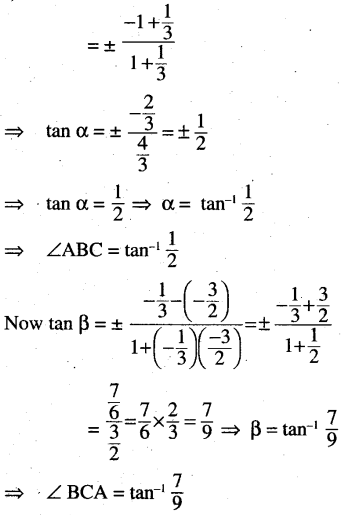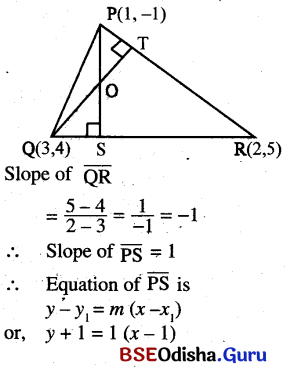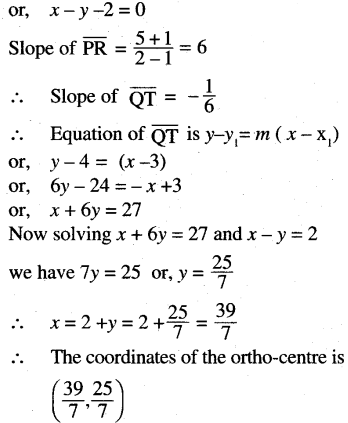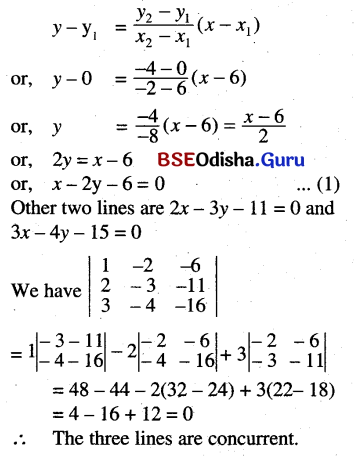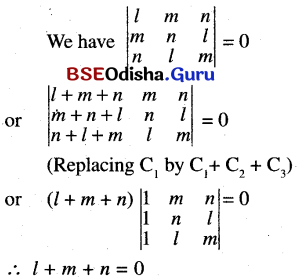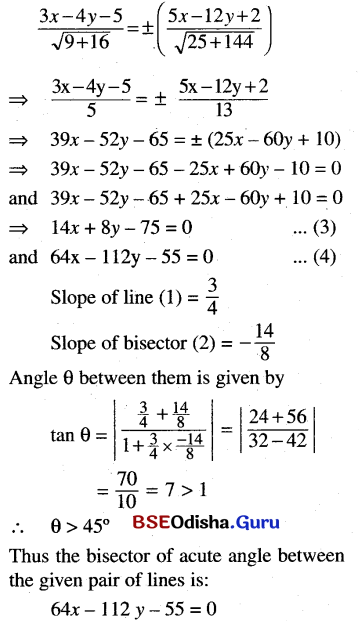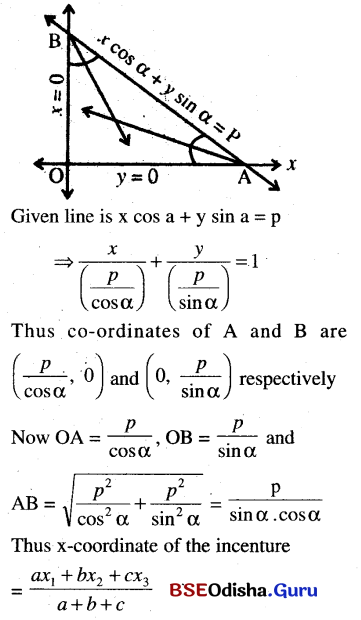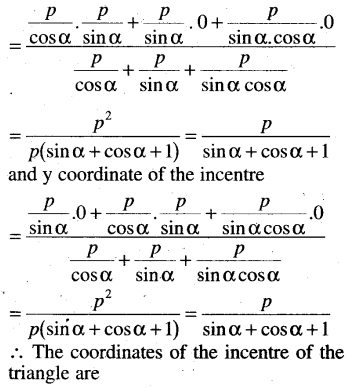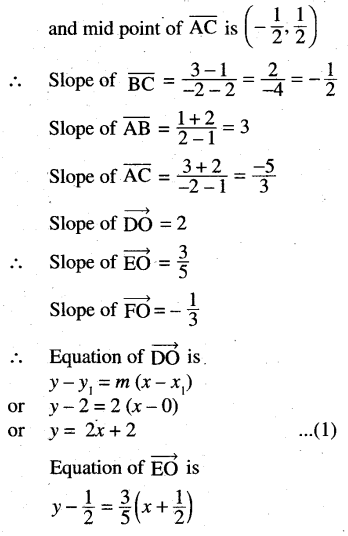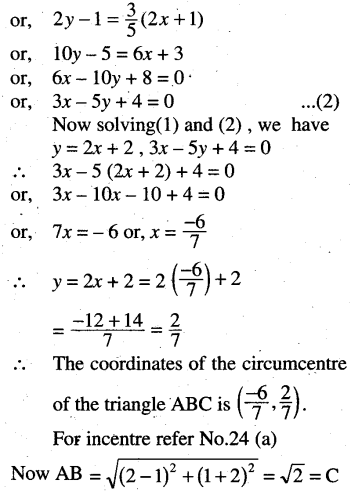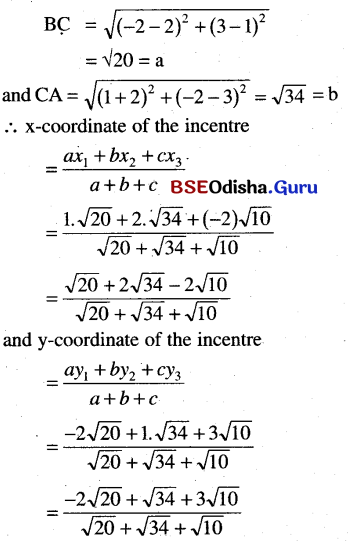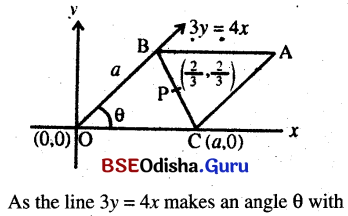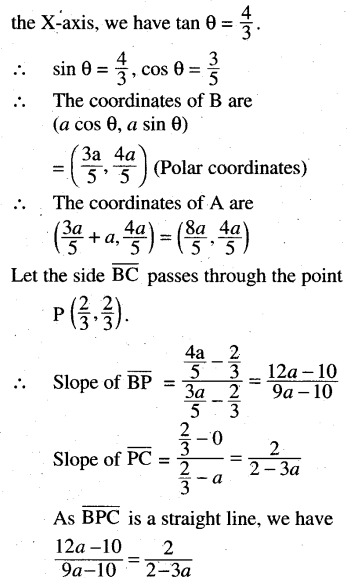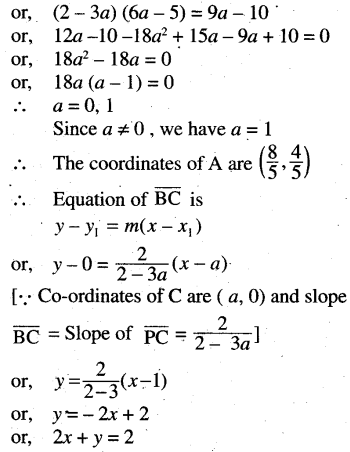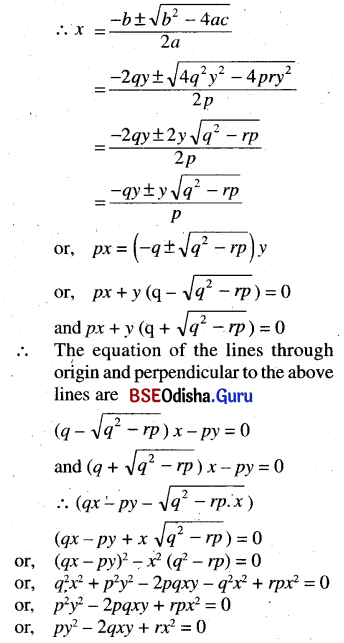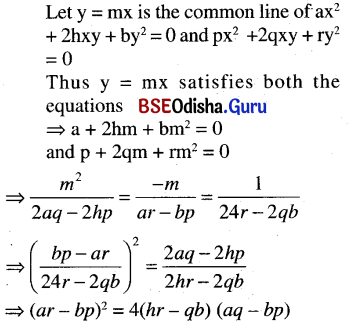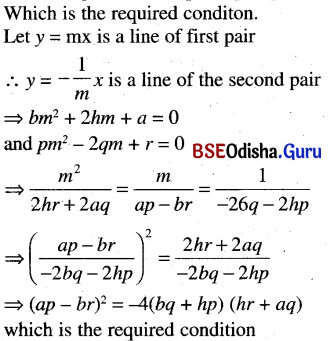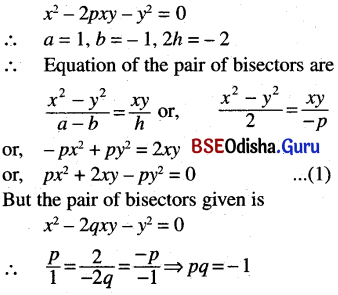Odisha State Board CHSE Odisha Class 12 Education Solutions Chapter 6 Meaning, Nature, and Factors of Learning Questions and Answers.
CHSE Odisha 12th Class Education Chapter 6 Question Answer Meaning, Nature, and Factors of Learning
Group – A
Short type Questions with Answers
I. Answer with in Two/Three sentence:
Question 1.
What is learning?
Answer:
Learning is the process through which individuals acquire knowledge, attitudes, and skills necessary to meet the demands of life; It involves a change in behavior or behavior potential brought about by experiences.
Question 2.
Give an example of vicarious learning.
Answer:
Observing someone else and learning from that observation without being directly involved in the experience is vicarious learning. For instance, a child learns how to clap hands by watching someone else do it.
Question 3.
According to John Dewey, how does learning occur?
Answer:
John Dewey described learning as an active and social process where individuals construct meaning through experiences. He emphasized hands-on, experiential learning for genuine understanding.
Question 4.
What did Lev Vygotsky contribute to the understanding of learning?
Answer:
Lev Vygotsky’s sociocultural theory highlights the significance of social interaction in learning. He introduced the Zone of Proximal Development (ZPD), where learning is most effective with guidance from a knowledgeable other.
Question 5.
How did B.F. Skinner define learning?
Answer:
B.F. Skinner, associated with behaviorism, defined learning as a change in behavior due to reinforcement or punishment. He focused on observable behaviors and the role of the environment in shaping behavior.

Question 6.
According to Carl Rogers, what is essential for meaningful education?
Answer:
Carl Rogers emphasized learner-centered education, stating that creating a supportive and non-judgmental. environment is essential. He believed that self-directed learning, driven by personal experiences and interests, is crucial for meaningful education.
Question 7.
How does the family influence a child’s learning process?
Answer:
The family shapes a child’s behavior patterns, social skills, and value orientation, serving as the primary site for learning cultural norms, interpersonal skills, and the do’s and don’ts of their community.
Question 8.
What role do peer relationships play in classroom learning?
Answer:
Healthy peer relationships create a tension-free environment, facilitating student learning and competition, while poor peer relationships can adversely affect the learning climate, emphasizing the importance of promoting positive interactions.
Question 9.
How does the socio-economic status of a group impact learning opportunities?
Answer:
The socio-economic status directly links to the degree of stimulation or enrichment available in the learning environment, with adequately enriching environments offering more learning opportunities compared to impoverished or needy environments.
Question 10.
What influence do caste, class, and religion have on identity and attitudes?
Answer:
Caste, class, and religion play a predominant role in shaping identity, self-concept, attitudes, and value orientation, contributing to variations in goals and achievement patterns across different groups.
Question 11.
Why is it recommended to organize free discussions during the teaching-learning process?
Answer:
Organizing free discussions helps improve the classroom learning climate by fostering a sound peer relationship, allowing students to meet and interact freely, and addressing any misunderstandings promptly to maintain a healthy and cordial environment.
II. Answer with in Five/Six sentence :
Question 1.
What is the essence of learning, and how does it manifest through experiences?
Answer:
Learning is the process through which individuals acquire knowledge, attitudes, and skills necessary for navigating life. It involves, a change in behavior or behavior potential resulting from experiences. For example, a child learns to avoid touching a burning candle after getting burnt. Learning can occur through both vicarious experiences, where individuals observe and learn from others, and direct experiences, involving personal engagement. This transformative process is crucial for adapting to the demands of life.
Question 2.
How do various educational theorists define learning, and what are their key perspectives?
Answer:
Educational theorists like John Dewey, Jean Piaget, Lev Vygotsky, Maria MontessOri, Jerome Bruner, B.F. Skinner, Howard Gardner, Albert Bandura, Ivan Pavlov, and Carl Rogers offer diverse definitions of learning. Dewey emphasizes experiential learning, while Piaget focuses on cognitive development. Vygotsky highlights social interaction, and Montessori emphasizes self- directed, hands-on learning. Skinner, with behaviorism, emphasizes reinforcement, and Gardner introduces multiple intelligences. Bandura stresses observation, and Pavlov associates learning with conditioned responses. Rogers advocates learner-centered education.

Question 3.
What are the key characteristics and the nature of learning?
Answer:
Learning is a lifelong, continuous process that involves the acquisition of knowledge, skills, and attitudes through experiences. It is purposive, goal-directed, and typically leads to some degree of permanence in behavior change. Learning is universal, occurring across ages, sexes, races, and cultures. It prepares individuals for adjustment to new situations and is comprehensive, covering cognitive, affective, and psychomotor domains. Learning involves organizing experiences, resulting in changes in responses or behavior, which may be favorable or unfavorable.
Question 4.
How does the concept of learning differ when viewed as a process versus a product?
Answer:
Viewing learning as a process emphasizes its internal and personal nature, contrasting with a product-oriented perspective where knowledge is seen as external and acquired. The process- oriented approach aligns with understanding the real world and using knowledge as a tool for survival. In contrast, the product-oriented view, criticized by Paulo Freire, likens education to a banking concept,, treating students as depositories and the teacher as the depositor.
Question 5.
Why is learning considered purposive, and what role does it play in the overall development of an individual?
Answer:
Learning is considered purposive because it is not an aimless activity; it is goal-directed. True learning is purposeful and contributes to the development of an individual. It involves adapting to new situations, achieving goals, and bringing about changes in behavior. Learning prepares individuals for effective adjustment to the challenges they encounter, ensuring a continuous, never- ending process that spans the entire lifespan.
Question 6.
How does the family contribute to a child’s learning, process?
Answer:
The family serves as the primary socialization agent, shaping a child’s behavior patterns, social skills, attitudes, and cultural norms. The child learns survival skills, interpersonal dynamics, and value orientations within the family context. Positive parent-child relationships, based on mutual respect, create a conducive learning atmosphere, while unhealthy environments can hinder learning, leading to resistance and difficulties in coping.
Question 7.
What role does the neighborhood and community play in a child’s learning?
Answer:
The neighborhood and community influence a child’s attitudes, habits, beliefs, and social roles through interactions with peers, age-mates, and elders. Conditioning, social learning, and modeling contribute to the child’s understanding of various aspects of life. Positive peer relationships enhance the learning environment, creating a tension-free atmosphere, while negative relationships can adversely affect learning outcomes.
Question 8.
What is the distinction between school culture and school climate, and how do they influence learning?
Answer:
School culture represents shared beliefs and attitudes at the district-wide level, guiding the organization’s identity, while school climate characterizes the feel of a school at the building and classroom levels. Culture is deeply ingrained and unconscious, reflected in artifacts, values, and assumptions. In contrast, climate focuses on feelings and attitudes, susceptible to change, and crucial for creating preconditions for effective teaching and learning. Changes in culture can impact climate positively or adversely. Both culture and climate are vital for shaping expected behaviors and improving academic performance.

Question 9.
What are the key components of school climate, and why is caring often considered a core element?
Answer:
School climate encompasses areas like appearance, faculty relations, student interactions, leadership, learning environment, attitude, and school-community relations. While there’s no consistent agreement on components, caring is often emphasized as a core element. A positive climate contributes to academic success, addresses issues like bullying and conflicts, and ensures a safe, orderly environment conducive to learning.
Question 10.
How do physical, social, affective, and academic environments collectively contribute to school climate?
Answer:
The physical environment, promoting social interaction and a warm, affective atmosphere, collectively contributes to the academic environment. These aspects of school climate are interrelated; for instance, a welcoming physical environment encourages social interaction, fostering a positive affective environment. Collectively, these elements impact and are impacted by the overall academic environment, influencing the learning experience for Students.
Question 11.
What role do school resources and policies play in influencing student learning?
Answer:
School resources, including learning materials, facilities, and infrastructure, are crucial in determining the effectiveness of learning. Proper management of physical resources, such as classrooms, libraries, laboratories, and sports facilities, contributes to a conducive learning environment. Additionally, school policies, administration nature, distribution of responsibilities, leadership, and disciplinary measures among staff and students are decisive factors influencing the learning outcomes for students.
Group – B
Long Type Questions With Answers
Question 1.
What is learning, and how does it take place? Provide examples to illustrate the learning process.
Answer:
• Learning is a multifaceted process through which individuals acquire new knowledge, skills, attitudes, or behaviors. It is a dynamic and continuous journey that occurs throughout life, influenced by various factors and experiences. The mechanisms of learning are diverse, encompassing formal education, observation, trial and error, and interactions with the environment. Understanding the intricacies of learning involves exploring its psychological, cognitive, and behavioral dimensions.
• At its core, learning involves the acquisition of information and the ability to apply that knowledge in different contexts. One prominent model of learning is the behaviorist perspective, which emphasizes observable behaviors and the role of external stimuli in shaping these behaviors. For instance, a child learning to say “please” and “thank you” after receiving positive reinforcement from parents or caregivers exemplifies behaviorist learning.
• Cognitive theories, on the other hand, delve into the mental processes involved in learning. Jean Piaget’s theory of cognitive development highlights how individuals construct knowledge through interaction with their environment. In a classroom setting, a student might learn mathematical concepts by assimilating new information into existing mental schemas.
• Social constructivism, championed by theorists like Lev Vygotsky, emphasizes the social and cultural influences on learning. It posits that learning is not only an individual endeavor but also a social process. For instance, a group of students working collaboratively on a project learns not only from the content but also from each other’s perspectives and contributions.
• Learning takes place through formal education systems, where structured curricula and instructional methods guide students in acquiring specific knowledge and skills. In a science class, students might learn about the principles of photosynthesis through lectures, laboratory experiments, and discussions. This formalized approach provides a systematic framework for learning and assessment.
• Observational learning, as proposed by Albert Bandura’s social learning theory, occurs through watching and imitating others. Children often learn behaviors and social norms by observing role models, such as parents, teachers, or peers. A child imitating a sibling’s mannerisms or a student emulating a successful classmate’s study habits exemplifies observational learning.
• Trial and error is a fundamental aspect of learning, especially in acquiring practical skills. When learning to ride a bicycle, individuals make adjustments based on their experiences – discovering the right balance, pedaling techniques, and steering control through a series of attempts. Trial and error contribute to skill refinement and the development of problem-solving capabilities.
• Interactions with the environment foster experiential learning, where individuals learn through direct engagement with real-world situations. An aspiring chef, for example, learns to cook by experimenting with ingredients, following recipes, and adjusting techniques based on taste end feedback. Experiential learning emphasizes hands-on experiences, encouraging a deeper understanding of concepts.
• The process of learning is not limited to a specific age or setting; it extends to lifelong learning. Adults, for instance, might engage in continuous learning through professional development courses, workshops, or self-directed exploration of new subjects. Lifelong learning reflects the adaptability of individuals to evolving knowledge and skills throughout their lives.
• In conclusion, learning is a dynamic and multifaceted process involving the acquisition of knowledge, skills, attitudes, and behaviors. It occurs through diverse mechanisms, including formal education, observation, trial and error, and interactions with the environment. Understanding the various dimensions of learning provides insights into how individuals navigate the complexities of acquiring and applying information throughout their lives.
Question 2.
What are the general characteristics of learning, and how do these characteristics contribute to the overall process of knowledge acquisition and skill development ? Answer: Learning, as a fundamental aspect of human development, exhibits several key characteristics that shape the overall process of knowledge acquisition and skill development. Understanding these characteristics provides insights into the dynamics of learning and its impact on individual growth and adaptation.
Adaptability: Learning is inherently adaptable, allowing individuals to adjust their behaviors, thoughts, and actions based on new information and experiences. This characteristic enables learners to navigate diverse situations, fostering flexibility and resilience in response to changing environments.
Individuality : Learning is a unique and individualized process. Each person brings their own background, prior knowledge, and cognitive abilities to the learning journey. Recognizing and respecting individual differences is essential for effective teaching and personalized learning experiences.
Active Engagement : Learning is most effective when individuals actively engage with the content or task. Active participation enhances understanding and retention, as learners process information through interactions, discussions, and hands-on experiences. This characteristic emphasizes the importance of learner involvement in the educational process.
Continuous and Lifelong : Learning is a continuous and lifelong endeavor that extends beyond formal education. Individuals engage in learning throughout their lives, adapting to new challenges, acquiring new skills, and staying abreast of evolving knowledge. Lifelong learning promotes personal and professional development.
Meaning-Making : Learning involves the construction of meaning from experiences and information. Learners interpret and relate new knowledge to their existing understanding, creating a personalized understanding of the subject matter. Meaning-making is essential for retention and application.
Social Influence: Learning is not only an individual process but is also influenced by social interactions. Collaborative learning, peer discussions, and mentorship contribute to a richer learning experience. Social interactions provide diverse perspectives, fostering a deeper understanding of concepts.
Multifaceted Modalities : Learning occurs through various modalities, encompassing visual, auditory, kinesthetic, and other sensory channels. Recognizing and accommodating diverse learning styles ensures that educational strategies cater to the varied needs of learners.
Feedback and Reflection : Learning benefits from timely feedback and reflection. Constructive feedback informs learners about their progress, highlights areas for improvement, and reinforces successful strategies. Reflection allows individuals to internalize learning experiences, enhancing metacognitive skills.
These characteristics collectively contribute to the overall process of knowledge acquisition and skill development. Adaptability enables individuals to apply learning in different contexts, while active engagement ensures a deeper understanding of the subject matter. Recognizing the individuality of learners and incorporating various modalities enhances accessibility and inclusivity in education.
Continuous and lifelong learning fosters a culture of curiosity and growth, promoting personal and professional development. Meaning-making and social influence emphasize the importance of meaningful connections and collaborative learning experiences.
In conclusion, the general characteristics of learning create a dynamic’ and versatile framework for acquiring knowledge and developing skills. Understanding and leveraging these characteristics in educational settings enhance the effectiveness of teaching methods and contribute to the holistic growth of individuals.

Question 3.
Examine various approaches to learning and assess the effectiveness of each. Which method stands out as the most effective, and what factors contribute to its superiority?
Answer:
Learning is a nuanced process, and various approaches cater to diverse preferences and objectives. Evaluating the effectiveness of each method involves considering factors such as engagement, retention, and adaptability. While individual preferences may influence the perceived effectiveness of a particular method, a comprehensive analysis sheds light on the multifaceted nature of learning.
Traditional Classroom Learning : Traditional classroom learning involves face-to-face interactions with instructors and peers. This method proyides structure, guidance, and immediate feedback. However, its effectiveness can be hindered by passive engagement, limited individualization, and challenges in adapting to diverse learning styles.
Online and E-Learning : The digital age has ushered in online and e-leaming platforms, offering flexibility and accessibility. These methods can cater to various learning preferences, allowing self-paced study and multimedia integration. However, concerns about limited interpersonal interactions and potential distractions may impact engagement and social aspects of learning.
Experiential Learning : Experiential learning emphasizes hands-on experiences, fostering active engagement and practical application. Field trips, simulations, and real-world projects enhance understanding and retention. However, logistical challenges, resource requirements, and potential time constraints can limit the widespread implementation of experiential learning.
Collaborative Learning: Collaborative learning encourages group interactions, discussions, and joint problem-solving. This approach enhances social skills, provides diverse perspectives, and promotes a sense of shared responsibility. However, challenges in group dynamics, potential inequalities in contribution, and individual preferences for autonomy may affect its effectiveness.
Self-Directed Learning: Self-directed learning empowers individuals to take control of their learning journey. This approach promotes autonomy, critical thinking, and personalized exploration. However, it requires strong self-discipline, motivation, and the ability to set and achieve goals, making it more suitable for certain learners.
Blended Learning: Blended learning combines traditional and online methods, offering a hybrid approach. It provides flexibility while maintaining some face-to-face interactions. Blended learning, addresses the limitations of both traditional and online methods, catering to a broader range of learning preferences.
Effectiveness Assessment: Determining the most effective learning method is subjective and contingent on various factors. Considerations include the nature of the subject matter, individual learning styles, technological infrastructure, and the availability of resources. Additionally, a combination of methods tailored to specific learning objectives may yield optimal results.
Conclusion : No single learning method universally stands out as the most effective. The suitability of an approach depends on the context and learner preferences. Blending methods to create a diverse and adaptive learning environment might be the key to addressing the varied needs of today’s learners. Ultimately, the effectiveness of a learning method is a dynamic and evolving concept that requires continual evaluation and adjustment.

Question 4.
Examine different elements impacting the learning process. Is it possible to enhance the learning’ experience?
Answer:
The learning process is intricately woven into a web of various elements that significantly influence its efficacy. Understanding these factors provides insights into potential avenues for improving the overall learning experience.
Socio-Cultural Environment : The socio-cultural context, including family dynamics, community influences, and cultural backgrounds, shapes an individual’s learning journey. Creating a supportive and inclusive environment that respects diverse perspectives and values can positively impact the learning experience.
Educational Environment: The school or educational setting plays a pivotal role in learning. Factors such as classroom climate, teacher-student relationships, and the availability of resources contribute to the overall educational experience. An engaging and well-equipped educational environment fosters a positive atmosphere for learning.
Individual Characteristics : Learner-specific traits, including prior knowledge, cognitive abilities, and motivation levels, significantly impact how information is processed and retained. Recognizing and addressing individual differences through personalized learning approaches can enhance overall comprehension and engagement.
Teaching Methods and Pedagogy : The choice of teaching methods and pedagogical approaches directly influences the effectiveness of knowledge transfer. Incorporating diverse instructional strategies, including experiential learning, collaborative activities, and technology integration, caters to varied learning styles and enhances the overall learning experience.
Technology Integration : In the digital age, technology has become a potent tool for learning. Utilizing educational technology, such as interactive simulations, online resources, and virtual classrooms, can enhance accessibility, engagement, and the overall effectiveness of the learning process.
Feedback Mechanisms : Regular and constructive feedback is crucial for learner growth. Implementing effective feedback mechanisms, including assessments, evaluations, and peer reviews, provides learners with valuable insights into their progress, fostering a culture of continuous improvement.
Lifelong Learning Opportunities : Creating a culture of lifelong learning beyond formal education expands opportunities for skill development and knowledge acquisition. Encouraging individuals to engage in continuous learning through workshops, online courses, and professional development programs contributes to ongoing personal and professional growth.
Inclusive and Diverse Curriculum : A curriculum that reflects diverse perspectives, cultures, and disciplines enriches the learning experience. Inclusivity in educational content ensures that learners encounter a broad range of ideas, fostering critical thinking and a more comprehensive understanding of the subject matter.
Enhancing the Learning Experience : Yes, learning can be improved by strategically addressing these factors. Implementing evidence-based teaching practices, fostering a positive socio-cultural and educational environment, leveraging technology, and adopting inclusive pedagogies contribute to an enriched learning experience.
In conclusion, the learning process is a complex interplay of multiple elements, each contributing to the overall efficacy of education. Recognizing these factors and actively seeking opportunities to enhance the learning experience empowers educators, institutions, and learners to create a more dynamic and impactful educational journey.
Group – C
Objective type Questions with Answers
II. Multiple Choice Questions with Answers :
Question 1.
What is the role of senses in the learning process?
(i) Senses have no significant impact on learning.
(ii) Learning is enhanced when the maximum number of senses is utilized.
(iii) Senses only play a role in theoretical subjects.
(iv) Learning is not influenced by sensory engagement.
Answer:
(ii) Learning is enhanced when the maximum number of senses is utilized.
Question 2.
How does revision and practice contribute to learning outcomes?
(i) They have no impact on learning.
(ii) They hinder the learning process.
(iii) They lead to better retention, reproduction, and utilization of learning.
(iv) Revision and practice only benefif certain subjecfs.
Answer:
(iii) They lead to better retention, reproduction, and utilization of learning.
Question 3.
What is emphasized regarding teaching methods in enhancing learning?
(i) Teacher-dominated methods are always more effective.
(ii) Lecture-based approaches are the most successful.
(iii) Learner-centered methods with teacher-pupil interaction are more helpful.
(iv) Teaching methods have no influence on learning outcomes.
Answer:
(iii) Learner-centered methods with teacher-pupil interaction are more helpful.
Question 4.
What are the two broad categories of media in the context of learning?
(i) Visual and auditory media.
(ii) Print and non-print media.
(iii) Digital and analog media.
(iv) Traditional and modem media.
Answer:
(ii) Print and non-print media.
Question 5.
How can non-print media contribute to learning more efficiently than print media?
(i) They are less engaging for students.
(ii) Non-print media lacks diversity.
(iii) They facilitate faster learning and meet diverse objectives.
(iv) Print media is always superior.
Answer:
(iii) They facilitate faster learning and meet diverse objectives.

Question 6.
What is school culture based on?
(i) Recent developments
(ii) Future aspirations
(iii) Shared beliefs and attitudes
(iv) Individual preferences
Answer:
(iii) Shared beliefs and attitudes
Question 7.
How does school climate differ from school culture?
(i) School climate is based on past experiences, while school culture is about future actions.
(ii) School climate is more about physical aspects, while school culture focuses on psychological aspects.
(iii) School climate characterizes the district-wide organization, while school culture is at the school building and classroom level.
(iv) There is no difference; the terms are used interchangeably.
Answer:
(ii) School climate is more about physical aspects, while school culture focuses on psychological aspects.
Question 8.
What does school climate mainly emphasize?
(i) Shared beliefs
(ii) Safety
(iii) School policies
(iv) Future aspirations
Answer:
(ii) Safety
Question 9.
What are the four aspects defining school climate in the comprehensive view?
(i) Physical, social, academic, and administrative
(ii) Emotional, cultural, learning, and environmental
(iii) Financial, technological, disciplinary, and leadership
(iv) Welcoming, communicative, affective, and academic
Answer:
(i) Physical, social, academic, and administrative
Question 10.
Which of the following is considered a physical resource influencing learning in school?
(i) School policies
(ii) Leadership
(iii) Library facilities
(iv) Accountability
Answer:
(iii) Library facilities
Question 11.
According to the social constructivist view, how is learning oriented and guided?
(i) Individually focused
(ii) Culturally oriented
(iii) Technologically driven
(iv) Biologically influenced
Answer:
(ii) Culturally oriented
Question 12.
What is the primary influence in the socialization process of an individual, shaping behavior patterns, attitudes, and values?
(i) School
(ii) Neighbourhood
(iii) Family
(iv) Peers
Answer:
(iii) Family
Question 13.
How does a healthy peer relationship impact learning?
(i) It hinders the learning process.
(ii) It creates a competitive and stressful environment.
(iii) It provides a tension-free environment for learning.
(iv) It has no significant influence on learning.
Answer:
(iii) It provides a tension-free environment for learning.
Question 14.
What role do caste, class, and religion play in shaping identity, self-concept, and attitudes?
(i) No significant role
(ii) Minor influence
(iii) Predominant role
(iv) Limited impact
Answer:
(iii) Predominant role

Question 15.
How does the socio-economic status of a group influence learning opportunities?
(i) No influence
(ii) Negligible impact
(iii) Directly linked with learning opportunities
(iv) Indirectly related to learning experiences
Answer:
(iii) Directly linked with learning opportunities
Question 16.
What is intelligence, according to Alfred Binet?
(i) The ability to deal with cognitive complexity
(ii) Judgment, practical sense, initiative
(iii) Goal-directed adaptive behavior
(iv) A set of problem-solving skills
Answer:
(ii) Judgment, practical sense, initiative. ,
Question 17.
According to Howard Gardner, how many distinct abilities are there in his theory of multiple intelligences?
(i) 5
(ii) 7
(iii) 8
(iv) 10
Answer:
(iii) 8
Question 18.
Which theory of intelligence describes three fundamental aspects: Analytic intelligence, Creative intelligence, and Practical intelligence?
(i) Cattell-Hom-Carroll theory
(ii) Howard Gardner’s multiple intelligences
(iii) Sternberg’s triarchic theory
(iv) Alfred Binet’s theory
Answer:
(iii) Sternberg’s triarchic theory
Question 19.
What is the aggregate or global capacity of an individual, according to David Wechsler?
(i) Logical-mathematical intelligence
(ii) Emotional intelligence
(iii) Practical intelligence
(iv) The capacity to act purposefully, think rationally, and deal effectively with the environment.
Answer:
(iv) The capacity to act’purposefully, think rationally, and deal effectively with the environment.
Question 20.
Which factor is at the top of the hierarchy in the Cattell-Horn-Carroll theory of intelligence?
(i) Fluid intelligence (Gf)
(ii) Crystallized intelligence (Gc)
(iii) General intelligence factor ‘g’
(iv) Quantitative reasoning (Gq)
Answer:
(iii) General intelligence factor ‘g’
Question 21.
What is the main role of motivation in the learning process?
(i) Hindering learning
(ii) Initiating learning
(iii) Stagnating learning
(iv) Irrelevant to learning
Answer:
(ii) Initiating learning
Question 22.
What is the term for an internal state that arouses, directs, and maintains behavior, according to the definition given in the passage?
(i) Emotion
(ii) Interest
(iii) Maturation
(iv) Motivation
Answer:
(iv) Motivation
Question 23.
According to the passage, what is maturation in the context of readiness to learn?
(i) Biological aging
(ii) Acquiring knowledge and skills
(iii) A natural process of unfolding development stages
(iv) Cognitive ability
Answer:
(iii) A natural process of unfolding development stages
Question 24.
How are intrinsic motivation and extrinsic motivation different?
(i) Intrinsic motivation is driven by external factors, while extrinsic is driven by internal factors.
(ii) Intrinsic motivation is for long-term goals, while extrinsic is for short-term goals.
(iii) Intrinsic motivation is internal to the individual, driven by the task itself, while extrinsic is driven by external rewards or punishment.
(iv) Intrinsic motivation is for learning, while extrinsic is for performance.
Answer:
(iii) Intrinsic motivation is internal to the individual, driven by the task itself, while extrinsic is driven by external rewards or punishment.

Question 25.
What does the triarchic theory of intelligence propose?
(i) Intelligence is a single, general ability.
(ii) Intelligence is comprised of three aspects: Analytic intelligence, Creative intelligence, and Practical intelligence.
(iii) Intelligence is solely based on cognitive abilities.
(iv) Intelligence is fixed and cannot be developed.
Answer:
(ii) Intelligence is comprised of three aspects: Analytic intelligence, Creative intelligence, and Practical intelligence.
Question 26.
What is intelligence, according to Alfred Binet?
(i) The ability to deal with cognitive complexity
(ii) Judgment, practical sense, initiative
(iii) Goal-directed adaptive behavior
(iv) A set of problem-solving skills
Answer:
(ii) Judgment, practical sense, initiative
Question 27.
According to the Cattell-Hom-Carroll theory, what is at the top of the hierarchy of factors related to intelligence ?
(i) Fluid intelligence (Gf)
(ii) Crystallized intelligence (Gc)
(hi) General intelligence factor ‘g’
(iv) Quantitative reasoning (Gq)
Answer:
(iii) General intelligence factor ‘g’
Question 28.
What are the three fundamental aspects of intelligence in Sternberg’s triarchic theory?
(i) Fluid, crystallized, and quantitative intelligence
(ii) Analytic, creative, and practical intelligence
(iii) Visual, auditory, and processing speed intelligence
(iv) Short-term memory, long-term storage, and retrieval intelligence
Answer:
(ii) Analytic, creative, and practical intelligence
Question 29.
What does the Theory of Successful Intelligence by Sternberg emphasize?
(i) The importance of fluid intelligence
(ii) The need for high IQ scores
(iii) The integration of analytic, creative, and practical intelligence
(iv) The dominance of crystallized intelligence
Answer:
(iii) The integration of analytic, creative, and practical intelligence
Question 30.
According to Howard Gardner, how many distinct abilities are there in his theory of multiple intelligences?
(i) Six
(ii) Seven
(iii) Eight
(iv) Ten
Answer:
(iii) Eight
Question 31.
What is motivation defined as formally?
(i) External stimuli that lead to behavior
(ii) An internal state that arouses, directs, and maintains behavior
(iii) The ability to adapt to a new environment
(iv) The aggregate capacity of the individual to act purposefully
Answer:
(ii) An internal state that arouses, directs, and maintains behavior
Question 32.
Which type of motivation is exhibited when a learner engages in an activity as a means to an end?
(i) Extrinsic motivation
(ii) Intrinsic motivation
(iii) Cognitive motivation
(iv) Emotional motivation
Answer:
(i) Extrinsic motivation
Question 33.
What is situated motivation?
(i) Motivation based on external rewards
(ii) Motivation influenced by the learner’s internal state
(iii) Motivation arising from environmental conditions
(iv) Motivation focused on personal goals
Answer:
(iii) Motivation arising from environmental conditions
Question 34.
How does maturation affect readiness to learn?
(i) Maturation accelerates the learning process
(ii) Maturation is unrelated to readiness
(iii) Maturation determines the appropriate time for learning
(iv) Maturation is a hindrance to learning
Answer:
(iii) Maturation determines the appropriate time for learning

Question 35.
What role do emotions play in learning?
(i) Emotions have no impact on learning
(ii) Emotions only affect learning negatively
(iii) Emotions have a bi-directional and complex relationship with learning
(iv) Emotions are unrelated to cognitive processes
Answer:
(iii) Emotions have a bi-directional and complex relationship with learning
Question 36.
How are interests related to learning?
(i) Interests have no impact on learning
(ii) Interests are determined by age only
(iii) Interests influence what one learns and how well
(iv) Interests are external factors in the learning process
Answer:
(iii) Interests influence what one learns and how well
II. Fill in the blanks :
Question 1.
Intelligence is positively related to the learning ability of children. Vandana, Iqbal, Sanjay, Elizabeth, and Vishal showcase different _____ .
Answer:
Talents
Question 2.
Psychometric testing is widely used to measure intelligence, with IQ tests reflecting the Cattell-Hom-Carroll theory’s hierarchy of factors, where ‘g’ stands for general _____.
Answer:
Intelligence
Question 3.
According to Howard Gardner, there are eight distinct areas of multiple _____ .
Answer:
Intelligence
Question 4.
Motivation is an internal state that arouses, directs, and maintains _____ .
Answer:
Behavior
Question 5.
Mr. Dey, the History teacher, struggles with his disinterested class, emphasizing the importance
of fostering _____ for learning.
Answer:
Motivation
Question 6.
Maturation is a relatively permanent change in an individual that occurs as a result of biological _____
Answer:
Aging
Question 7.
Emotions can affect learning both positively and _____.
Answer:
Negatively

Question 8.
Interests are determined by the need structure of an individual and influence what one learns best, serving as a key factor in _____.
Answer:
Motivation
Question 9.
Attitudes, whether positive or negative, influence the direction, intensity, and commitment with which one engages in an _____.
Answer:
Activity
Question 10.
Prejudice is a negative attitude towards an object or event, while stereotypes represent a mind set or readiness to react in a certain way to a _____.
Answer:
Stimulus situation
Question 11.
The limbic system, located in the middle of the brain, interprets and directs _____ and behavior.
Answer: Emotions
Question 12.
The triarcbic theory of intelligence proposed by Robert Sternberg includes Analytic, Creative, and Practical _____.
Answer:
Intelligence
Question 13.
In the Cattell-Horn-Carroll theory, ‘g’ represents the general _____ factor at tjie top of the hierarchy.
Answer:
Intelligence
Question 14.
Motivation plays a pivotal role in activating, guiding, and maintaining _____.
Answer:
Learning
Question 15.
Adequate motivation not only sets activities in motion but also sustains and directs these activities, serving as an indispensable factor in promoting _____.
Answer:
Learning

Question 16.
Family has a significant impact on a child’s, _____ influencing behavior patterns, social skills, and cultural norms.
Answer:
Learning
Question 17.
A congenial atmosphere based on mutual respect and faith in the child-parent relationship can positively impact the student’s _____.
Answer:
Learning
Question 18.
The _____ and community contribute to shaping a child’s attitudes, habits, beliefs, and social roles through direct and indirect experiences.
Answer:
Neighbourhood
Question 19.
A sound peer relationship in the classroom creates a tension-free environment, facilitating better _____ and competition among students.
Answer:
Learning
Question 20.
Socio-economic status is directly linked to the degree of _____ available in the learning environment, influencing learning opportunities.
Answer:
Stimulation
Question 21.
The term ‘school environment’ includes both ‘school culture’ and ‘school climate,’ which affect the behavior of _____ and _____
Answer:
teachers, students.
Question 22.
_____ reflects the shared beliefs and attitudes that characterize the districtwide organization and establish boundaries for its constituent units.
Answer:
School culture.
Question 23.
School culture is based on past experience and provides a template for future action based on “how we do things in this _____.”
Answer:
organization.
Question 24.
School climate focuses on the feelings and attitudes about a school expressed by ______, _____, _____, and _____.
Answer:
students, teachers, staff, parents.
Question 25.
The physical and psychological aspects of the school that are more susceptible to change and provide the preconditions ‘necessary for teaching and learning to take place are part of the _____.
Answer:
school climate.
Question 26.
Learning, according to John Dewey, is an _____ process where individuals construct meaning through experiences.
Answer:
active and social

Question 27.
According to Lev Vygotsky, learning is most effective in the Zone of Proximal Development (ZPD) with guidance from a knowledgeable _____.
Answer:
other
Question 28.
B.F. Skinner, associated with behaviorism, defined learning as a change in behavior due to _____ or punishment.
Answer:
reinforcement
Question 29.
Learning is a process that involves some degree of _____ as temporary changes in behavior are not considered true learning.
Answer:
permanence
Question 30.
Learning is _____ and continuous, applicable to every creature throughout their life.
Answer:
universal
Question 31.
Learning is a comprehensive process that covers all domains of human behavior, including Cognitive, Affective, and _____ domains.
Answer:
Psychomotor
Question 32.
Changes in behavior due to native response tendencies like instincts and reflexes are not considered part of the process of _____.
Answer:
Learning
III. Correct the Sentences:
Question 1.
Learning is the process by which an individual acquires knowledge, attitudes, and skills that are necessary to meet the demands of life.
Answer:
Learning is the process through which individuals acquire knowledge, attitudes, and skills essential to meet the demands of life.
Question 2.
He emphasized hands-on, experientialieaming as essential for genuine understanding. Answer: Dewey emphasized hands-on, experiential learning as essential for genuine understanding.
Question 3.
For example, a child learns how to clap hands by moving someone else do it.
Answer:
For example, a child learns how to clap hands by seeing someone else do it.
Question 4.
Learning occupies a very important place in our life.
Answer:
Learning occupies a crucial place in our life.
Question 5.
Attitudes, fears, gestures, motor skills, language skills, etc. are the products of learning Answer: Attitudes, fears, gestures, motor skills, language skills, etc., are the outcomes of learning.

Question 6.
Learning is an aimless activity.
Answer:
Learning is not an aimless activity.
Question 7.
Learning helps the individual to adjust herself/himself adequately and adapt to the changes that may be necessary to the new situations.
Answer:
Learning helps the individual to adjust themselves adequately and adapt to the changes that may be necessary in new situations.
Question 8.
Carryinging the content matter by a learner for examination and forgetting it after sometime does not bring any change (to some extent to permanence) in the total behaviour pattern of the learner.
Answer:
Cramming the content matter by a learner for examination and forgetting it after soihe time does not bring any lasting change in the
total behavior pattern of the learner.
Question 9.
Learning is comprehensive.The scope of leaning is spread over each and every dimension of life.
Answer:
Learning is comprehensive: The scope of learning is spread over each and every dimension of life.
Question 10.
Learning leads to changes in behavior but this does not necessarily mean that these changes always bring about improvement or negative development.
Answer:
Learning leads to changes in behavior, but this does not necessarily mean that these changes always bring about improvement or positive development.

Question 11.
Changes in behaviour on the basis of native response tendencies like instructs and reflexes (e.g. infant’s sucking behaviour, blinking at bright lights) cannot be attributed to learning. Answer: Changes in behavior based on native response tendencies like instincts and reflexes (e.g., infant’s sucking behavior, blinking at bright lights) cannot be attributed to learning.
Question 12.
Varied teaching methods, catering to different leaning styles, enhance understanding and interest.
Answer:
Varied teaching methods, catering to different learning styles, enhance understanding and interest.
Question 13.
Employing a mix of instructional techniques ensures that students with same learning preferences can access and benefit from the material.
Answer:
Employing a mix of instructional techniques ensures that students with diverse learning preferences can access and benefit from the material.
II. Answer the following questions in one word :
Question 1.
What is learning?
Answer:
Learning is the process of acquiring knowledge, attitudes, and skills through experiences, leading to a change in behavior.
Question 2.
How can learning occur?
Answer:
Learning can result from both direct experiences and observing others (vicarious experiences).
Question 3.
According to John Dewey, what is the nature of learning?
Answer:
John Dewey viewed learning as an active and social process where individuals construct meaning through experiences.
Question 4.
What does Piaget’s theory emphasize about learning?
Answer:
Piaget’s theory highlights learning as a process of adaptation and assimilation, with stages in intellectual growth.
Question 5.
According to Vygotsky, what is crucial for effective learning?
Answer:
Vygotsky emphasized the significance of social interaction in learning, introducing the Zone of Proximal Development (ZPD).
Question 6.
How did B.F. Skinner define learning?
Answer:
Skinner defined learning as a change in behavior due to reinforcement or punishment, focusing on observable behaviors.
Question 7.
What is the Zone of Proximal Development (ZPD) in learning?
Answer:
ZPD, proposed by Vygotsky, is the range where learning is most effective with guidance from a knowledgeable other.

Question 8.
What did Maria Montessori emphasize about learning?
Answer:
Montessori viewed learning as a natural process unfolding in a prepared environment, promoting self-directed, hands-on learning.
Question 9.
How did Ivan Pavlov contribute to the understanding of learning?
Answer:
Pavlov, known for classical conditioning, viewed learning as a process of associating stimuli with responses.
Question 10.
According to Carl Rogers, what is essential for meaningful education?
Answer:
Rogers emphasized learner-centered education, stating that a supportive and.non- judgmental environment is crucial for meaningful learning.
Question 11.
What is intelligence, according to Howard Gardner’s theory?
Answer:
Intelligence, according to Gardner, involves eight distinct abilities, including linguistic, logical-mathematical, spatial, musical, bodily-kinesthetic, interpersonal, intrapersonal, and naturalist intelligence. .
Question 12.
How does motivation impact learning, according to the text?
Answer:
Motivation serves to activate, guide, and maintain behavior; it directs behavior toward goals, increases effort and energy, and affects cognitive processes.
Question 13.
What is extrinsic motivation?
Answer:
Extrinsic motivation is when individuals are driven by external factors, such as grades, money, or recognition, rather than finding inherent pleasure or interest in the task itself.
Question 14.
What does maturation refer to in the context of learning readiness?
Answer:
Maturation is the relatively permanent change in an individual’s cognitive, emotional, or physical aspects due to biological aging, influencing their readiness to learn specific skills or concepts.
Question 15.
Why is it important for teachers to consider maturation in their teaching approach?
Answer:
Maturation determines the readiness for learning, guiding teachers in deciding what, how, and when to teach based on the developmental stages of their students.

Question 16.
What is the primary influence of the family in a child’s learning process?
Answer:
The family shapes behavior patterns, social skills, and cultural norms for the child’s learning.
Question 17.
How does a healthy peer relationship impact learning in a classroom?
Answer:
It creates a tension-free environment, promoting better learning and competition among students.
Question 18.
What role do caste, class, and religion play in shaping identity and attitudes in our country?
Answer:
They significantly influence self-concept, attitudes, and value orientation in individuals.
Question 19.
Why is a distorted and unhealthy family environment detrimental to a student’s learning?
Answer:
It adversely affects the student’s ability to cope and resist learning.
Question 20.
According to the social constructivist view, what guides all learning?
Answer:
Learning is culturally oriented and guided according to the social constructivist view.
Introduction
Learning is the process by which an individual acquires knowledge, attitudes and skills that are necessary to meet the demands of life. While touching a burning candle, a child gets burnt and he withdraws the fingers. When he faces a similar situation again he withdraws his fingers faster. Gradually he learns to avoid not only the burning candle but also other burning things. The behaviour of an individual is thus changed through experiences. This change in behaviour brought about by experiences is commonly known as learning.
Thus, Learning means change in behaviour or behaviour potential that occurs as a result of experience. Learning can result from both vicarious and direct experiences. Vicarious means observing someone and learning from that observation and not being directly involved in the experience. For example, a child learns how to clap hands by seeing someone else do it. Learning also takes place through direct experiences. For example, a child learns to write by practicing writing. A child normally learns from his parents, teachers and the environment.
Definitions of Learning :
• John Dewey (1859-1952): Learning, according to Dewey, is an active and social process where individuals construct meaning through experiences. He emphasized hands-on, experiential learning as essential for genuine understanding.
• Jean Piaget (1896-1980) : Piaget’s theory of cognitive development posits that learning is a process of adaptation and assimilation. He highlighted the role of stages in intellectual growth, where individuals actively construct knowledge through interactions with their environment.
• Lev Vygotsky (1896-1934) : Vygotsky’s sociocultural theor/ emphasizes the significance of social interaction in learning. He proposed the concept of the Zone of Proximal Development (ZPD), where learning is most effective with guidance from a knowledgeable other.
• Maria Montessori (1870-1952) : Montessori viewed learning as a natural process that unfolds in a prepared environment. She emphasized the importance of self-directed, hands- on learning and believed that children learn best through exploration and discovery.
• Jerome Bruner (1915-2016) : Bruner stressed the importance of the active organization of knowledge. His constructivist theory posited that learning involves a spiral curriculum, where complex ideas are presented at a basic level and revisited as learners develop a deeper understanding.
• B.F. Skinner (1904-1990) : Skinner, associated with behaviorism, defined learning as a change in behavior due to reinforcement or punishment. He focused on observable behaviors and the role of the environment in shaping and controlling behavior.
• Howard Gardner (b. 1943) : Gardner proposed the theory of multiple intelligences, suggesting that learning is diverse and individuals have varying strengths in different forms of intelligence. He identified several intelligences, including linguistic, logical-mathematical, and interpersonal.
• Albert Bandura (b. 1925) : Bandura’s social cognitive theory posits that learning occurs through observation, imitation, and modeling. He emphasized the role of self-efficacy, where individuals ’ beliefs about their abilities influence their learning and behavior.
• Ivan Pavlov (1849-1936): Pavlov, known for classical conditioning, viewed learning as a process of associating stimuli with responses. He conducted experiments with dogs, demonstrating how behaviors could be elicited through conditioned responses to stimuli.
• Carl Rogers (1902-1987) : Rogers emphasized learner-centered education, where learning is facilitated by creating a supportive and non-judgmental environment. He believed that self-directed learning, driven by personal experiences and interests, is essential for meaningful education.
Nature of learning:
Learning occupies a very important place in our life. It provides a key to the structure of our personality and behaviour. Experience, direct or indirect, plays a very important and dominating role in moulding and shaping the behaviour of the individual from the very beginning. When a child touches a hot pan and gets burnt, s/he immediately withdraws her/his hand and learns to touch such vessels carefully. S/he concludes that if one touches a hot vessel, one gets burnt.
In the same way from other experiences, in her/his day to day life, s/he derives different conclusions and modifies her/his behaviour. These changes in behaviour brought about by experience are commonly known as learning and this process of gaining experiences, drawing conclusions, and changing behaviour goes on from womb to tomb.
• Learning is a process and not a product : Learning is a fundamental and life-long process. Attitudes, fears, gestures, motor skills, language skills, etc. are the products of learning. They are not learning themselves. In a classroom, when learning is viewed as a product then it is viewed as something external. Something like shopping- people go out and buy knowledge and then it becomes their possession.
Paulo Freire in his book ‘Pedagogy of the Oppressed’ criticizes this and says that education thus becomes an act of depositing, in which the students are the depositories and the teacher is the depositor. In this ‘banking’concept of education, the teacher is the subject of the learning process, while the pupils are mere objects. Whereas, when learning is viewed as a process, it is viewed as something internal or personal. It is something that a child does in order to understand the real world and uses it as a tool for survival.
• Learning is purposive or goal directed : Learning is not an aimless activity. All true learning is based on purpose. We do not learn anything and everything that comes in our way in a haphazard manner. However, some experts argue that sometimes learning is unintended.
• Learning generally involves some degree of permanence : Activities bringing temporary change in behaviour and not lasting do not come under learning. For example, cramming the content matter by a learner for examination and forgetting it after sometime does not bring any change (to some extent to permanence) in the total behaviour pattern of the learner and thus this type of learning cannot be said as true learning.
• Learning is universal and continuous : Every creature till it lives, learns. In human beings it is not restricted to any particular age, sex, race or culture. It is a continuous never- ending process which starts from birth and continues till death.
• Learning prepares for adjustment: Learning helps the individual to adjust herself/himself adequately and adapt to the changes that may be necessary to the new situations. We meet with new situations which demand solutions. Repeated efforts are required react to them effectively. These experiences leave behind some effects in the mental structure and modify our behaviour.
• Learning is comprehensive : The scope of learning is spread over each and every dimension of life. It is a very comprehensive process which covers all domains – Cognitive, Affective and Psychomotor- of human behaviour.
• Learning is change in response or behaviour may be favourable or unfavourable : Learning leads to changes in behavior but this does not necessarily mean that these changes always bring about improvement or positive development. There are chances to drift to the negative side too.
• Learning is organizing experience : Learning involves all those experience and training of an individual (right from birth) which help her/him to produce changes in behaviour. It is not mere addition to knowledge or mere acquisition of facts. It is the reorganization of experience which may also include unlearning.
• Instincts and reflexes are not learning : Changes in behaviour on the basis of native response tendencies like instincts and reflexes (e.g. infant’s sucking behaviour, blinking at bright lights)cannot be attributed to learning.
• Learning does not include changes in behaviour on account of maturation, fatigue, illness, or drug etc.
Types of Learning :
Understanding that learning encompasses a broad spectrum of skills, attitudes, and competencies is crucial for enhancing efficiency and effectiveness in our environment. These learnings can be direct or indirect, acquired through experience, conscious effort, critical thinking, reasoning, and even emotions. Let’s explore some of the various types of learning that individuals engage in:
1. Cognitive Learning: Cognitive learning, also known as intellectual learning, involves gaining information, memorization, and understanding relationships between ideas. School and college education primarily focuses on cognitive learning, but it is not limited to formal settings. Everyday activities contribute to cognitive learning as individuals gradually comprehend and improve their skills through insight and understanding.
2. Psychomotor Learning : Psychomotor learning pertains to the development of physical skills and muscular coordination, such as riding a bicycle, stitching, or playing sports. Skills involving eye-hand coordination or gross and fine motor skills fall under psychomotor learning. Mastery of these physical abilities contributes to overall skill development.
3. Affective Learning : Affective learning involves emotions and feelings, including fear, love, passion, and dislikes. Influenced by socio-cultural and emotional surroundings, affective learning encompasses both positive and negative emotions. Children, for instance, absorb values and attitudes from their family, and individuals often unconsciously adopt behaviors and sentiments from their environment.
4. Collateral or Concomitant Learning : Unconscious learning from the environment, acquiring attitudes, values, and preferences. Children observing their parents’ behavior learn values and attitudes. Teachers, while primarily focused on teaching subjects, also influence students’ behavior, leading to collateral or concomitant learning.
5. Discrimination Learning : Discrimination learning involves distinguishing between similar or related concepts, emphasizing differences. Gagne places discrimination learning before concept learning, highlighting the importance of understanding subtle differences between concepts. This process contributes to effective concept learning.
6. Principles Learning: Similar to concept learning, principles learning involves understanding relationships within situations, noting common features and relationships. Principles learning focuses on identifying and generalizing common relationships. Principles have applicability in problem-solving and can be applied deductively to parallel situations.
7. Factors Affecting Learning : Learning is a complex process influenced by a myriad of factors that shape individuals’ abilities, preferences, and outcomes. Understanding these factors is crucial for educators, policymakers, and learners themselves to create effective and inclusive learning environments. In this extensive exploration, we delve into the multifaceted dimensions of the factors affecting learning, categorizing them into learner-related, teacher-related, task-related, and environment-related factors.
Learner-Related Factors :
• Maturation : Maturation plays a pivotal role in determining a learner’s readiness to engage in and benefit from the learning process. Physical, intellectual, and socio-emotional maturation are essential components. For instance, a one-year-old might not be developmentally ready to write, emphasizing the importance of aligning educational expectations with the individuai’s stage of maturation.
• Motivation : Motivation is a driving force behind learning. Intrinsic motivation, derived from internal satisfaction and interest, contrasts with extrinsic motivation, driven by external rewards or consequences. Understanding what motivates an individual is crucial for educators. For example, a student’s intrinsic motivation for a particular subject, like Ashok’s passion for cricket, can significantly impact the depth and sustainability of learning.
• Psychological Needs : Psychological needs, encompassing desires unique to individuals, greatly influence learning preferences and engagement. These needs include love, belongingness, social prestige, esteem, recognition, affiliation, self-expression, creativity, aesthetics, and higher cognitive quests. Recognizing and addressing these needs can enhance the relevance and meaningfulness of the learning experience.
• Self-Concept: Self-concept, the beliefs individuals hold about their talents, potentialities, weaknesses, and strengths, shapes their behavior and learning orientations. Positive self-concept fosters effective learning, while a negative self-image may hinder academic performance. Understanding and nurturing a positive self-concept is crucial for educators.
Levels of Aspiration : The extent to which an individual strives to achieve, known as their levels of aspiration, influences the dedication and effort put into learning. Setting high aspirations can propel learners to engage more intensively with the learning process, fostering a sense of purpose and direction.
• Interests : Interests are activities or pastimes voluntarily engaged in for enjoyment. Individuals are more likely to invest time and energy in areas of personal interest. Recognizing and incorporating students’ interests into the learning curriculum can enhance motivation and facilitate a more enjoyable learning experience.
• Study and Work Habits : Effective study and work habits are instrumental in determining the efficiency of the learning process. Organizing material, managing time judiciously, and employing strategic learning methods contribute to better performance. Educators play a crucial role in guiding students to develop effective study habits. Understanding and addressing these learner-related factors require personalized approaches that acknowledge the diversity of individuals and their unique learning profiles.
Teacher-Related Factors :
Personality: The teacher’s personality traits significantly influence the classroom atmosphere and student engagement. Modelling, enthusiasm, caring, and positive expectations create a conducive learning environment. Teachers who exhibit these traits can inspire and motivate students to actively participate in the learning process.
Communication : Effective communication is paramount in facilitating understanding and engagement. Clear and engaging communication enhances students’ comprehension and involvement. Teachers must convey information in a manner that resonates with diverse learning styles, ensuring that all students have access to the material.
Leadership Style : The teacher’s leadership style shapes the classroom dynamics and student response. Whether adopting an authoritarian, democratic, benevolent, or indifferent approach, the teacher’s leadership style influences the freedom of communication and student motivation. Creating an environment that encourages open dialogue and collaboration fosters a positive learning atmosphere.
Interpersonal Relationships : The relationships teachers cultivate with their students significantly impact the emotional tone and motivation within the classroom. Positive relationships, characterized by respect, empathy, and open communication, create a comfortable and motivated learning environment. Conversely, negative relationships may induce fear and hinder the learning experience.
Teaching Styles : The manner in which teachers present information, known as their teaching styles, can vary widely. Some teachers may adopt a lecture-based approach, while others favor interactive or hands-on methods. Recognizing and incorporating diverse teaching Styles can accommodate different learning preferences, ensuring a more inclusive educational experience.
Expectations : Teacher expectations play a crucial role in shaping student behavior and outcomes. Positive teacher expectations communicate that all students, can learn to their fullest potential. Teachers who set reasonable expectations and create a trusting and supportive learning environment can inspire students to meet and exceed those expectations.
Task Interpretation : How teachers interpret and present tasks to students influences the perceived meaning, purpose, and relevance of the learning material. Aligning tasks with real-world implications and demonstrating the applicability of knowledge enhances students’ understanding and motivation. Task interpretation is central to bridging the gap between academic content and its practical significance. Understanding and leveraging these teacher-related factors require ongoing professional development and a commitment to creating a positive and inclusive learning environment.
Task-Related Factors :
1. Methods Used : Teaching methods and strategies impact the comprehension and engagement of students. Varied teaching methods, catering to different learning styles, enhance understanding and interest. Employing a mix of instructional techniques ensures that students with diverse learning preferences can access and benefit from the material.
2. Nature of Task : The complexity and relevance of tasks significantly influence student motivation and learning outcomes. Tasks aligned with real-world implications and applicability enhance meaning and purpose in learning. Educators must carefully design tasks that challenge students while fostering a sense of value and accomplishment.
3. Teaching Aids Used : Visual aids and resources contribute to the effectiveness of teaching and student understanding. Incorporating multimedia presentations, interactive tools, and other visual aids enhances the visual and experiential aspects of learning. Utilizing a variety of teaching aids caters to diverse learning styles and reinforces key concepts.
4. Structure of the Discipline : The organization and presentation of subject matter impact students’ grasp of concepts. A well-structured curriculum facilitates systematic learning and comprehension. Educators must carefully consider how content is organized and presented to ensure that students can build a coherent understanding of the discipline. Task-related factors require educators to be flexible and adaptive, tailoring instructional approaches to the specific needs and preferences of their students.
Environment-Related Factors :
1. Physical Environment: The physical setting of the classroom, including factors such as seating arrangement, lighting, and overall comfort, can impact the learning experience. A well- organized, comfortable classroom promotes focus and engagement. Educators must consider the physical environment’s influence on student well-being and concentration.
2. Socio-Emotional Climate : The interpersonal feeling tones within the classroom, known as the socio-emotional climate, significantly influence student receptivity and productivity. Positive
classroom climate, characterized by respect, empathy, and open communication, enhances motivation and learning outcomes. Fostering a supportive and inclusive socio-emotional climate is essential for creating a conducive learning environment.
3. Attention to Environmental Factors : Recognition of external factors, such as climate and comfort, is crucial for understanding their impact on learning. Teachers and administrators must consider the influence of physical comfort and socio-emotional dynamics on student engagement and performance. Addressing environmental factors ensures a more holistic approach to supporting learners.
Conclusion : In conclusion, learning is a multifaceted process intricately woven with various factors that influence its dynamics. Learner-related factors emphasize the importance of recognizing individual differences and tailoring educational approaches to diverse needs. Teacher-related factors underscore the critical role educators play in creating a positive and inclusive learning environment through their personalities, communication, and instructional strategies.
Task-related factors highlight the need for well-designed and relevant learning tasks that challenge students while fostering a sense of value and accomplishment. Finally, environment- related factors encompass the physical and socio-emotional aspects of the learning environment, emphasizing the need for comfortable and supportive surroundings.
Understanding and addressing these factors require collaboration among educators,policymakers, and learners themselves. Ongoing research and professional development are essential to stay abreast of evolving educational practices that promote effective and inclusive learning experiences. By acknowledging the intricate interplay of these factors, we pave the way for a more enriching and equitable educational landscape.
![]()
![]()
![]()
![]()
![]()
![]()
![]()
![]()
![]()
![]()
![]()
![]()
![]()
![]()
![]()

